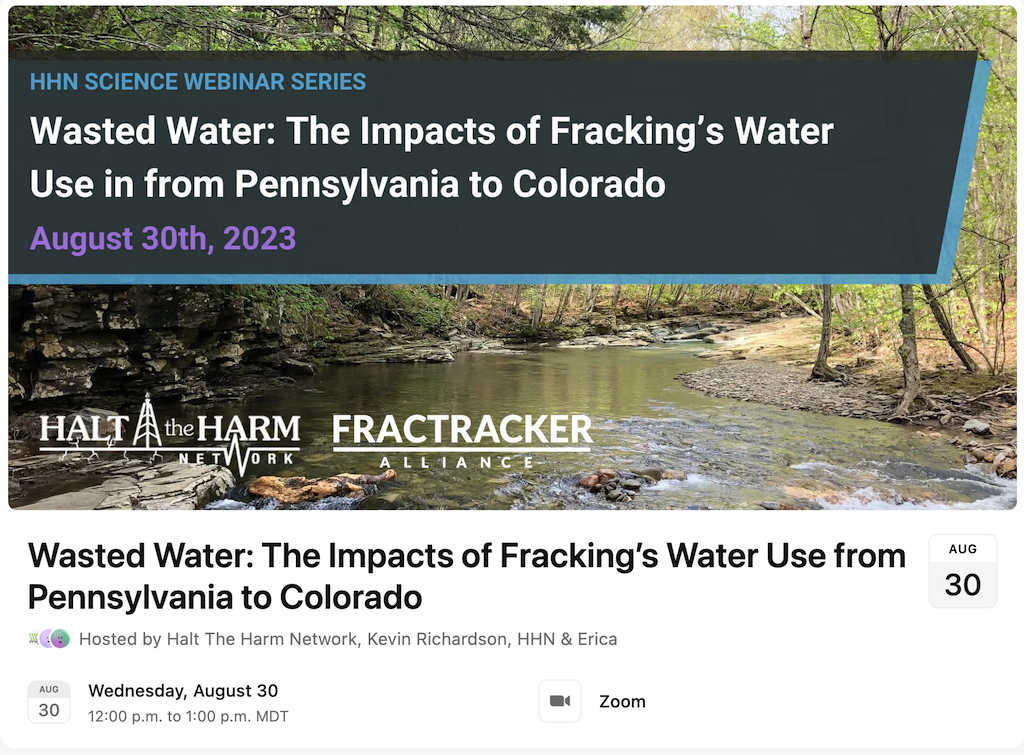
Wasted Water: The Impacts of Fracking’s Water Use from Pennsylvania to Colorado by Halt The Harm Network, Kevin Richardson, HHN & Erica
Wednesday, August 30
12:00 p.m. to 1:00 p.m. MDT
Registration
Hello! To join the event, please register at link above
About Event
Join FracTracker Alliance and Halt the Harm Network for a special webinar on the impacts of the fracking industry’s reckless water usage. We’ll discuss how much water fracking wastes in Pennsylvania, the industry’s lack of transparency, and how local groups are fighting back. We’ll also hear how Colorado is dealing with similar issues in a water scarce environment.
The webinar is part of Halt the Harm’s efforts to bring together a nationwide network of local leaders & groups protecting their communities from oil & gas harms and connect them to the support, resources, and expertise they need.
In Pennsylvania fracking operations consume a staggering 19 million gallons of freshwater per well. Once those millions of gallons of surface water are taken for fracking, the water is permanently removed from the water cycle, impacting the quantity and quality of water in the ecosystem.
This has big implications for Pennsylvania, where available water is decreasing and droughts are becoming more frequent due to climate change. Yet, there is little to no transparency on where the industry is removing the water, how much it is taking, and the prices they are paying for it.
Water is a public resource that belongs to the people of Pennsylvania, not the fracking industry.
At the webinar, FracTracker’s Health Fellow, Kat Wilson will discuss how much water the industry is taking from Pennysylvanian’s water system based on her efforts to piece together the available evidence on fracking’s water consumption. She’ll discuss the impacts on small watersheds and how Water Management Plans could be strengthened by instituting stronger protections for small watersheds and watersheds experiencing drought.
After Kat’s presentation, grassroots leaders Rosie Reilly and Julie Dicenzo from Southwest Pennsylvania will share their successful campaign efforts to prevent water fracking’s withdrawals from their local creek.
This a problem across every state where fracking is happening, and FracTracker’s Kyle Ferrar will also join us to discuss how the oil & gas industry recklessly wastes water in Colorado and what potential solutions exist in the state.
Speakers:
Kat Wilson, FracTracker Alliance
Rosie Reilly, a biologist and water quality specialist from Beaver County, PA
Julie DiCenzo, a former medical writer and editor from Allegheny County, PA
Kyle Ferrar, FracTracker AllianceThis event will be interactive and we encourage people to turn their cameras on and participate in the discussion after the presentations and in the chat!

Refer also to:
…
A proportion (25% to 100%) of the water used in hydraulic fracturing is not recovered, and consequently this water is lost permanently to re-use, which differs from some other water uses in which water can be recovered and processed for re-use.
…
2023: Frac Canada Dry!
